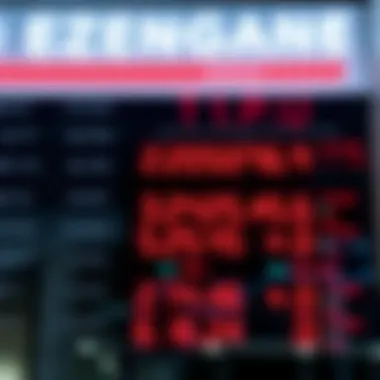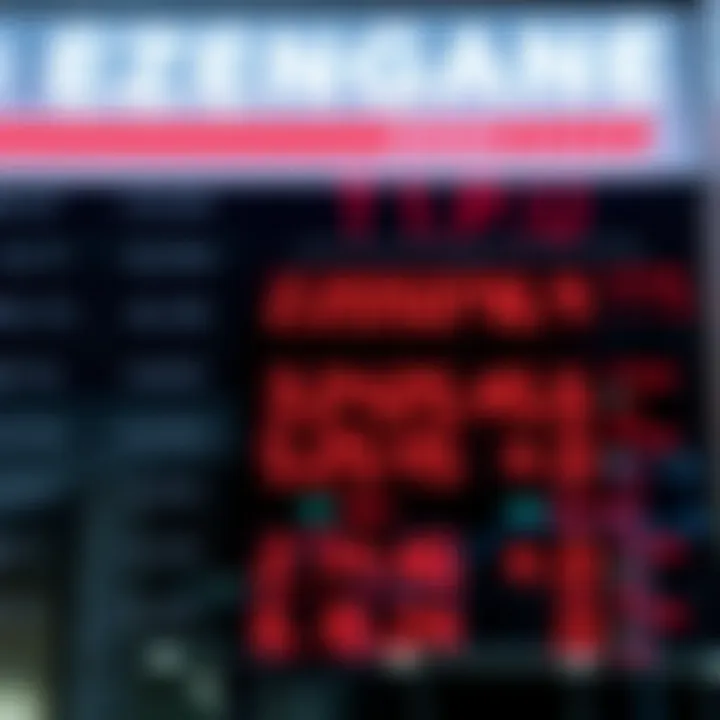220000 USD to AED: Currency Insights for Dubai Property


Intro
Navigating the world of real estate, particularly in a bustling hub like Dubai, can be a daunting endeavor, especially when dealing with foreign currencies like the US dollar. With a substantial figure like 220,000 USD, understanding how it translates to AED and what that means for your property investment is crucial. This article sheds light on the complexities of currency conversion within the context of Dubai’s dynamic real estate market, examining how investors can make informed decisions in a landscape characterized by rapid growth and fluctuating exchange rates.
Understanding the conversion process is not just about numbers; it’s about grasping the broader economic implications. The article unfolds insights on purchasing power and regional economic factors affecting property values. Whether you are considering buying a villa in Palm Jumeirah, investing in a downtown apartment, or even contemplating a commercial property, the conversion of your funds holds weighty significance.
Moreover, this is not merely an academic exercise; the practical tips and detailed analysis will guide you through the maze of investments, revealing how best to leverage your currency against Dubai’s impressive skyline. From market trends to various types of properties and financing options, each segment aims to equip you with the knowledge to make sound decisions as you dip your toes into Dubai’s lucrative real estate waters.
Understanding Currency Conversion
Understanding currency conversion is crucial for anyone looking to invest in Dubai's real estate market. The fluctuations in currency values can significantly impact purchasing power, making it essential for investors and buyers to grasp how currency exchange works. When we talk about 220,000 USD, it’s not just a number; it represents potential opportunities, challenges, and real investment decisions that can alter one's financial landscape.
Proper understanding can mitigate risks associated with sudden currency shifts. For instance, if you convert USD to AED with a favorable exchange rate, your buying capacity increases. Conversely, a poor rate means you might end up paying more for the same property. Additionally, recognizing the factors that influence currency rates helps in making educated decisions about the timing of your investments.
The Basics of Currency Exchange
Currency exchange is the process of converting one currency into another at a definite rate known as the exchange rate. Essentially, each currency has a specific value in relation to another one. When you hear that the exchange rate is 3.67 AED for every 1 USD, it tells you how many dirhams you need to purchase a dollar. But where does this rate come from?
Some key points to consider include:
- Market Dynamics: The Forex market operates on supply and demand principles. A rise in demand for USD can push the value of AED down, making your dirhams less effective compared to dollars.
- Direct and Indirect Rates: Currencies can be quoted directly, such as AED per USD, or indirectly when looking at USD per AED. Understanding both perspectives can help in predicting market movements.
- Exchange Platforms: Different platforms—be it banks, online exchanges, or physical currency exchange counters—offer varied rates due to fees and market access.
Knowing these basic fundamentals arms investors with the information necessary to make effective financial decisions.
Factors Influencing Currency Rates
Several elements determine the ever-changing landscape of currency rates. Knowing these factors can empower investors to gauge the right time for property investment.
- Economic Indicators: GDP growth, unemployment rates, and inflation statistics can sway currency value dramatically. A growing economy typically strengthens its currency.
- Political Stability: Countries with a stable political climate tend to have stronger currencies. Conversely, political turmoil can lead to a loss of investor confidence, impacting the currency's value.
- Market Sentiment: Often, currency values are influenced by traders’ perceptions about where the economy is headed. Speculation can lead to price fluctuations.
- Interest Rates: Higher interest rates offer lenders in an economy a higher return relative to other countries. This attracts foreign capital and pushes the exchange rate upward.
- Global Events: Events like natural disasters, changes in international trade policies, and pandemics can drastically affect market confidence and thus currency values.
Understanding these factors is essential for investors aiming to make the most informed decisions in the Dubai real estate market.
Current Exchange Rate Overview
Understanding the current exchange rate is crucial when considering a significant investment in Dubai's real estate market. The exchange rate directly impacts the value of money converted from USD to AED, affecting purchasing power and investment potential. The fluctuating nature of exchange rates means that investors must stay informed about real-time rates to make educated decisions.
Keeping an eye on exchange rates can make you feel as though you’re trying to hit a moving target. That said, knowing the current rate can help maximize your investment. A drop in the exchange rate may feel like a hammer blow to your buying power, while a favorable increase can provide the boost needed to secure a prime property.
How to Check Real-Time Rates
To stay updated on real-time exchange rates, investors can use a variety of accessible platforms. Here are some effective methods:
- Financial news websites: Reliable sources like Bloomberg and Reuters provide live updates on currency rates, crucial for timely decision-making.
- Mobile apps: There are apps such as XE Currency Converter and OANDA that display conversions in real-time and can notify users about significant fluctuations.
- Commercial banks: Banks often provide the rates used for actual currency conversion, which may differ from market rates. It’s worth contacting your bank or visiting their site to get the numbers that matter when you’re ready to transact.
Understanding Bid and Ask Prices
When engaging with currency exchange, understanding bid and ask prices is fundamental.
- Bid Price: This is the price at which you can sell your currency. In essence, if you’re looking to convert your USD to AED, the bid price reflects the amount you would receive.
- Ask Price: This is the price that you would pay to buy AED with USD. This price is always higher than the bid price, so when planning your investment, keep in mind that the gap represents the exchange fees.
"Knowing both the bid and ask prices can minimize surprises during currency conversion, ensuring that your finances align smoothly with your investment goals."
In the grand scheme, understanding these concepts might not seem like much, but they play a vital role in the nitty-gritty of making investments. As you dive into the Dubai real estate market, familiarity with current exchange rates and pricing dynamics can put you steps ahead.
Conversion Calculation: USD to AED
Understanding how to convert 220,000 USD to AED plays a crucial role in the context of investing in Dubai's real estate market. Currency conversion isn't merely about numbers; it's about grasping the economic landscape that influences purchasing decisions.
Investors and expatriates need to get a handle on this aspect as it directly affects their buying power. Knowing the conversion rate at any moment can mean the difference between landing a desirable property or missing out completely.
Breaking Down the Conversion Process
When it comes to the conversion of USD to AED, several steps are involved. First, you need to identify the current exchange rate. This can change daily based on various factors like market demand, geopolitical events, and economic indicators affecting both America and the UAE.
After that, you have to look at the transaction fees that might come into play, which could eat into your investment. Some banks charge a fee, while others offer competitive rates with lower or no fees.


When you have the current rate and understand the fees, you can easily perform this simple calculation:
- Get the current exchange rate (let's assume it's 3.67 AED for 1 USD).
- Multiply the USD amount by the exchange rate.
- Formula:
To visualize:
In this example, knowing the conversion process allows buyers to make informed decisions.
USD Converted to AED
Taking the provided conversion calculation into account:
This figure is essential for any buyer as it outlines their financial capability in the Dubai real estate market.
A couple of things worth noting here:
- Market Fluctuations: Currency values can sway due to economic conditions. So ensure you're only using current data.
- Future Projections: Stay tuned into potential fluctuations, as they might influence property values.
"Understanding the conversion not only improves your negotiating power but unveils a comprehensive picture of the real estate landscape in Dubai."
It's vital for potential buyers to grasp not just how much AED they have but what those dollars mean in terms of the Dubai property market's pricing structure. This level of understanding can be a game changer as you navigate your investment journey in one of the most dynamic cities in the world.
Impact on Real Estate Investment
The conversion of 220,000 USD to AED has significant implications in the context of real estate investment in Dubai. Understanding how this conversion influences one’s purchasing power is crucial for investors looking to navigate through the competitive property landscape. Currency fluctuations can shift the dynamics of real estate transactions, where every dirham counts.
One primary element to consider is the impact of exchange rates on buying power. When the AED is strong against the USD, investors can acquire more property for their dollar, enhancing their potential returns. Conversely, if the AED weakens, the cost to secure these investments rises, possibly squeezing profits. Therefore, vigilant monitoring of exchange rates is a must for anyone serious about investing in Dubai's real estate market.
Moreover, this conversion highlights regional economic conditions influencing investment decisions. For instance, fluctuations in oil prices can directly affect the strength of the AED, with possible repercussions on property demand. Investors need to keep an eye on broader economic indicators as well as specific market trends in Dubai.
Recognizing these factors helps prospective buyers make informed decisions. With fluctuations in currency conversion impacting both present investments and future returns, a strategic approach is necessary to maximize investment outcomes.
The discussion does not end with immediate purchasing power, but rather extends into considering market trends and long-term value of properties. Both short and long-term investments can be influenced by the strength of the dollar against the dirham, shaping the landscape for both buyers and sellers.
Assessing Buying Power in AED
Assessing one’s buying power in AED is vital for thorough financial planning in the Dubai property market. After converting 220,000 USD to AED, an investor knows precisely what they’re working with. With the current exchange rate fluctuating, this knowledge can significantly alter how much property can be acquired.
The currency conversion plays a pivotal role in determining affordability. For instance, if 220,000 USD converts to 808,000 AED during a favorable exchange rate period, this could open doors to various property types, from apartments to villas. Understanding these conversions allows individuals to benchmark their options effectively.
Investors should be aware that buying power isn't solely determined by currency strength; one must also consider additional costs like fees, taxes, and potential renovation expenses when planning their budget. Therefore, assessing buying power isn't just about the raw numbers—it's examining every angle to ensure any investment remains a sound financial decision.
Comparative Analysis of Investments
Real Estate versus Other Investments
When it comes to evaluating Real Estate versus other forms of investments, the unique attributes of each become pivotal in shaping investment strategies. Real estate often stands out due to its tangible nature and potential for appreciation over time. Property can serve as a hedge against inflation, a characteristic that many other investments, like stocks or bonds, might not provide as robustly.
Investing in real estate can also yield consistent cash flow through rentals, something less predictable in other markets. While the stock market may promise higher quick returns, it often carries significant volatility. This steadiness in real estate makes it an attractive selection for those looking for stability.
However, it is also essential to note its drawbacks. Liquidity in real estate is often a sticking point, as selling a property usually takes longer than liquidating stock shares. All these factors come together to paint a comprehensive picture of why real estate is a preferred option for many investors in the current economic environment, especially with the fluctuations in currency exchange.
Long-Term Value Considerations
Long-term value considerations bring another layer of depth to the investment discussion. Real estate generally appreciates in value over longer periods, providing investors with substantial returns. An investor who purchased a property when the AED was weak against the USD may benefit tremendously if currency values shift favorably over time.
The intrinsic value of real estate lies not only in its physical existence but also in the increasing demand for quality living spaces in thriving markets like Dubai. Factors such as population growth, urban development, and infrastructure improvements play significant roles in enhancing long-term value.
Nevertheless, potential investors need to be mindful of various elements influencing long-term investment viability. Economic downturns, shifts in regulations, or unexpected market changes could affect property values. An investor must keep abreast of trends to protect their investment against these potential risks while capitalizing on opportunities whenever they arise.
Understanding the Dubai Real Estate Market


Understanding the intricacies of the Dubai real estate market is paramount for those contemplating investments, rentings, or even just dabbling in this vibrant landscape. Dubai's market is marked by rapid growth and evolution, shaped by various economic and social factors. Investors need to recognize that this is not just about purchasing property; it encompasses a broader spectrum of economic indicators, market trends, and regional diversities that influence their decisions.
Market Trends in Dubai
The pulse of Dubai’s real estate market is dynamic, fluctuating with local and global economic shifts. For instance, the past few years have seen a rebound post-pandemic, propelled by increased foreign investment and a buoyant tourism sector. This market is characterized by several notable trends:
- Strong demand for residential properties: Given the influx of expatriates and professionals settling in Dubai, the need for adequate housing has surged.
- Shift towards sustainable developments: Many new projects are focusing on green buildings and sustainable living, appealing to an increasingly eco-conscious investor base.
- Technology integration: The advent of smart homes and digital real estate services has also transformed how properties are marketed and sold.
These trends are crucial for understanding where to allocate funds effectively and how to gauge potential profit margins.
Regions of Focus for Investment
Downtown Dubai
Downtown Dubai, home to the iconic Burj Khalifa and the extravagant Dubai Mall, offers more than just stunning views. This locale is a focal point of tourism and commerce, making it a lucrative area for real estate investments. Its key characteristic lies in its blend of luxury living with vibrant entertainment and retail options. The area's unique feature is its urban planning, which includes pedestrian-friendly spaces that enhance the lifestyle appeal. The advantages are clear: higher rental yields and a booming property market. However, the disadvantage is that such premium real estate comes at a higher upfront cost, which investors must consider.
Dubai Marina
Dubai Marina is famed for its stunning waterfront properties and energetic lifestyle. It’s a magnet for both tourists and long-term residents, emphasizing leisure and luxury living. The key characteristic here is the waterfront lifestyle, complemented by cafes, restaurants, and leisure facilities lining the marina. The unique feature of Dubai Marina is its vibrant atmosphere, often seen as one of the most desirable locations for both property investment and personal residence. Notably, the rental prices here can be enticing, providing a steady stream of income for landlords. Nonetheless, potential disadvantages may include fluctuating property prices affected by seasonal tourism, which can impact overall investment stability.
Jumeirah Village Circle
Jumeirah Village Circle (JVC) represents a perfect blend of affordability and convenience. It is designed to offer a family-friendly environment, featuring various amenities and community facilities. The key characteristic of JVC is its family-friendly community vibe, catering mainly to young professionals and families seeking a quieter lifestyle away from the buzz of downtown. A unique feature is the diversity of property types available, ranging from apartments to villas, accommodating different budgets. One significant advantage here is the relatively lower entry price compared to other parts of Dubai, making it attractive for first-time investors. However, some disadvantages may be identified in terms of slower appreciation rates compared to more central locations, which might affect long-term investment returns.
Understanding these regions and their unique offerings can aid investors not just in making informed decisions but also in aligning their investments with their financial goals.
Investment Strategies for Expatriates
Investing in real estate can be a daunting task, particularly for expatriates navigating a foreign market like Dubai’s. Understanding investment strategies specifically tailored for expatriates is essential for maximizing returns while minimizing risks. This section expands on key aspects that make these strategies vital for expatriates in Dubai’s dynamic real estate environment.
Navigating Legalities in Property Ownership
Before diving headfirst into property ownership, expats need to understand the legal landscape. In Dubai, the laws surrounding foreign investments are quite distinct from many other places. Foreigners are allowed to purchase property in designated areas, known as freehold areas. It’s crucial to familiarize yourself with these regulations to avoid pitfalls.
Here are some important legal considerations:
- Property Types: Foreign ownership is restricted to specific types of properties. It's important to conduct thorough research on freehold and leasehold arrangements.
- Ownership Structures: Understanding how to structure ownership, via personal name or company registration, can influence tax implications and inheritance issues.
- Regulatory Compliance: Navigating through the registration process, obtaining permits, and adhering to the local laws can be complex. Consulting with a legal expert in UAE property law is advisable.
The right legal guidance will help expatriates steer clear of any unexpected challenges while ensuring a smooth transaction process.
Evaluating Financing Options
Financing can often feel like swimming in deep waters without a life vest. Expatriates must evaluate various financing options available in Dubai to make a well-informed decision. Many banks and financial institutions in Dubai cater to foreign investors, offering a variety of mortgage products. Here’s what to keep in mind:
- Types of Mortgages: Explore options such as fixed-rate and variable-rate mortgages. Each comes with its pros and cons, affecting your overall cost in the long run.
- Loan-to-Value Ratios (LTV): Typically, LTV ratios for expats can be lower compared to locals, often up to 75%. Understanding these limits can help plan your finances effectively.
- Interest Rates & Fees: Shop around for the best interest rates. The cost of borrowing can vary greatly among lenders, so it pays to do some digging.
"A little bit of research can go a long way in ensuring your hard-earned money is placed wisely in a thriving market like Dubai."
- Currency Exchange Risks: Given the fluctuating exchange rates, especially between USD and AED, expatriates should consider how currency movement affects their mortgage payments and overall investment costs.
Taking the time to thoroughly assess your financing options can be the difference between a lucrative investment and a financial burden.
Practical Steps for Investors
Navigating the complexities of real estate investment in Dubai requires a focused approach that brings clarity and strategy to the table. For potential investors, especially expatriates, understanding the practical steps of the investment process can make a world of difference. This section aims to streamline the purchasing experience, ultimately guiding investors towards a successful acquisition in a dynamic market.
Preparing for a Property Purchase
Before diving headfirst into the buying waters, it’s essential to lay down a solid foundation.
Establishing a Budget
Establishing a budget is often the linchpin of any successful property purchase. It sets the financial boundaries within which an investor must navigate. Defining a budget isn’t just about the purchase price; it extends to additional costs such as registration fees, agency charges, and even potential renovations. A clear budget helps in prioritizing properties that actually fit financial expectations rather than wasting time on homes that are out of reach.
Moreover, establishing a budget reveals the key characteristic of financial discipline. This discipline allows investors to avoid emotional pitfalls associated with high-pressure purchases. It’s a popular choice in this environment because the Dubai market can be quite overwhelming, making it easy to lose sight of one’s financial constraints amid the glittering skyline.


However, one must also consider the risk of underestimating costs, particularly in a vibrant and often changing market like Dubai's. A tightly set budget can lead to missed opportunities if more resources are not allocated for unforeseen expenses.
"Not every shiny object is gold. Always have a buffer in your budget to catch surprises on the way."
Considerations for Renovation Costs
Considering renovation costs is another pivotal aspect of preparing for any property purchase. Properties in Dubai often come in various states of condition; older units may charm with history but can also demand a hefty sum for modernizing. Investors should factor in these potential costs from the get-go.
What makes renovation cost considerations so essential is the key characteristic of foresight. Looking ahead to potential adjustments allows an investor to plan not just for the acquisition but also for the long-term viability of the asset. Given that properties in key locations may appreciate over time, understanding necessary renovations can lead to better informed financial decisions.
Yet, investing in renovations isn’t without its pitfalls. On one hand, a comprehensive upgrade can significantly increase a property’s value. On the other hand, there's always the risk that renovations might not yield the expected returns. Here, investors could find themselves caught in a lengthy process without recouping their investments.
Choosing a Real Estate Agent in Dubai
Choosing the right real estate agent in Dubai can make a world of difference. Agents serve as the bridge in the ever-evolving property landscape, providing insights that would otherwise remain hidden. A local expert not only possesses knowledge of the market trends but also has insider knowledge of upcoming neighborhoods and potential developments.
When engaging an agent, investors should seek recommendations and review past successes. Building a rapport with an agent can facilitate a smoother process; communication is key in this partnership. An informed investor can clearly articulate needs and receive tailored options, leading to more satisfactory outcomes.
In essence, each step taken in the realm of investment matters. By establishing a budget, considering renovation costs, and choosing a reliable real estate agent, investors position themselves favorably in Dubai's competitive market.
Risk Management in Real Estate Investments
Navigating the Dubai real estate market requires not only a keen eye for opportunities but also an acute awareness of the risks involved in currency fluctuations. Investors venturing into this dynamic property landscape must understand how exchange rate volatility can impact their financial commitments. Currency risk can lead to unpredictable twists in an investment's return, making risk management an essential element of successful property dealings in Dubai.
Investing in real estate typically entails substantial monetary commitments. Failing to address potential risks can expose investors to significant losses. Proper risk management practices enable investors to not only safeguard their investments but also increase their chances of capitalizing on favorable market conditions. Below are critical elements to consider in this context:
- Understanding Currency Volatility: Currency rates can swing dramatically within short periods. This not only affects the purchase power but also impacts long-term returns.
- Setting Up Safeguards: Investors should look into financial instruments like options or futures to hedge against unfavorable rate changes.
- Diversification of Investment: By spreading investments across different properties or regions, investors can mitigate risks associated with specific market downtrends.
Overall, effective risk management is about proactive planning and preparation, ensuring that investors can ride the waves of currency fluctuations rather than succumb to them.
Identifying Risks in Currency Fluctuations
Identifying risks stemming from currency fluctuations is the first step toward effective risk management. In the realm of Dubai's real estate, where dealings often involve international currencies, fluctuations can have various implications for investors, especially those converting a significant sum like 220,000 USD to AED.
- Exchange Rate Variability: The value of the USD against the AED can be influenced by factors such as economic indicators, geopolitical tensions, or even speculation. Such fluctuations can introduce volatility into property prices, impacting overall investment costs.
- Impact on Rental Yields: If the AED strengthens against the USD, it can diminish the attractiveness of rental yields for US-based investors, shifting financial expectations dramatically.
- Foreign Ownership Laws: Investors must also consider potential shifts in laws governing foreign ownership, which can further complicate the landscape and increase risk.
Investors must remain vigilant and conduct thorough market analyses to identify these risks accurately, allowing them to make informed decisions.
Mitigation Strategies for Property Investors
Once investors have recognized the risks associated with currency fluctuations, the next step is to implement strategies that mitigate these risks. Here are some effective approaches that property investors might consider:
- Use Currency Forward Contracts: This financial instrument allows investors to lock in exchange rates for future transactions, providing a cushion against rate volatility.
- Stay Informed: Keeping track of global financial news and economic indicators can provide insights into potential currency shifts, enabling investors to adjust strategies accordingly.
- Consult Financial Experts: Engaging with financial advisors who specialize in currency risk can provide tailored guidance and enhance decision-making.
"In real estate, as with most investments, knowledge is power. Being informed about currency fluctuations not only helps mitigate risks but also opens doors to seizing opportunities when they arise."
By considering these strategies, investors can navigate the uncertain waters of currency conversion with more confidence, minimizing risks while increasing the likelihood of achieving favorable outcomes.
Ending
The conclusion of this article is not just a closing statement; it wraps up all the insights and learning that we have gathered regarding the conversion of 220,000 USD to AED, especially within the ambit of the Dubai real estate market. As potential investors—be they first-timers or seasoned pros—understanding how currency fluctuations and conversion processes impact purchasing power is absolutely crucial. It’s one thing to know how much property you might afford; it’s another to truly grasp how those dollars translate into dirhams and what that means for your investment.
To be precise, several key elements merit focus:
- Real-Time Conversion: Knowing the conversion value as it stands today not only helps you evaluate if now is the right time to invest but can also aid in making negotiations smoother during real estate transactions.
- Investment Landscape: The dynamics of Dubai's real estate market are ever-changing, influenced by both local and global economic factors. Thus, being informed helps in making strategic choices about where, when, and how much to invest.
- Purchasing Power: Ultimately, the ability to translate your USD into AED effectively could very well dictate how far you can stretch your budget in the competitive market of Dubai. With this, one can better judge which properties are within reach, ensuring that your investment aligns with long-term financial goals.
In essence, summing everything up, the importance of understanding these currency conversion elements cannot be overstated. It enhances knowledge about the market, guiding educated decisions that can safeguard your investments and help you seize promising opportunities in the Dubai real estate landscape.
Summarizing Key Insights
Throughout this article, we examined the multifaceted nature of converting 220,000 USD into AED. Here are some standout points:
- Exchange Rates Matter: Keeping an eye on the current rate is essential, as buying power fluctuates accordingly.
- Market Trends: Dubai's real estate market presents unique opportunities, and understanding the geography of investments can unveil lucrative options.
- Legal and Financial Framework: Familiarity with local laws and financing mechanisms is a non-negotiable aspect for expatriates looking to invest.
- Risk and Mitigation: Being aware of the inherent risks involved with currency fluctuations equips investors to devise strategies to mitigate them.
These points create a sturdy framework for both new and seasoned investors aiming to navigate the complex nature of Dubai's real estate market proficiently.
Future Projections for Currency and Real Estate
Looking ahead, the trajectory of currency and real estate in Dubai involves several noteworthy projections. Anticipated developments include:
- Technological Advancements: As tech continues to permeate various sectors, expect real-time data on currency rates and property values to become more accessible, fostering informed decision-making.
- Regulatory Changes: Future shifts in regulations might reshape investment landscapes and how currency aligns with real estate. Remaining adaptive is vital.
- Economic Conditions: Global economic conditions will continue to play a crucial role, impacting both currency values and the attractiveness of investing in Dubai.
- Sustainability Focus: An increase in sustainable and innovative projects can potentially attract newer investor demographics, especially targeting environmentally-conscious funds.
By keeping an ear to the ground and staying updated on these trends, prospective investors can make foresighted decisions, ensuring that their investments not only meet today's needs but are also robust enough to weather whatever financial storms might come their way. Navigating currency conversion effectively in tandem with market realities will continue to be a significant aspect of the investment process in Dubai's vibrant real estate market.











